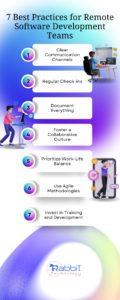
Essential Tools and Best Practices for Remote Software Development Teams
Introduction:
Remote work has become a permanent fixture in the tech industry, especially for software development teams. With the right tools and best practices, remote teams can overcome challenges and take advantage of unique opportunities to enhance productivity, collaboration, and communication. This comprehensive guide will explore essential tools and best practices that can help remote software development teams thrive.
Communication Tools:
Successful remote teams must communicate effectively. You can use a variety of tools, including the ones listed below.
Slack: Slack is a popular messaging platform that facilitates real-time communication and collaboration. With channels for different projects, direct messaging, and numerous integrations with other tools, it is ideal for keeping team members connected and informed.
Zoom: Zoom has become synonymous with virtual meetings, webinars, and video conferencing. Its features include screen sharing, breakout rooms, and recording capabilities, making it an indispensable tool for remote teams.
Microsoft Teams: Microsoft Teams combines chat, video meetings, file storage, and app integration on one platform. It integrates seamlessly with Office 365, providing a unified communication and collaboration experience.
Project Management Tools:

Managing projects remotely requires robust tools to track progress, assign tasks, and ensure accountability:
Jira: Jira is tailored for software development teams, offering features to track tasks, manage agile workflows, and maintain project transparency. It is especially useful for teams using Scrum or Kanban methodologies.
Trello: Trello uses boards, lists, and cards to organize tasks and visualize workflows. Its intuitive drag-and-drop interface makes it easy for teams to stay organized and on top of their work.
Asana: Asana allows teams to create tasks, set deadlines, assign responsibilities, and track progress. Its project timelines and workload management features help ensure that projects stay on schedule.
Version Control Tools:
Version control is critical for software development, allowing teams to manage changes to code and collaborate effectively.
GitHub: GitHub is the leading platform for managing code repositories. It provides features for version control, code reviews, and project management, making it an essential tool for developers.
GitLab: GitLab offers a comprehensive DevOps solution, including source code management, CI/CD pipelines, and monitoring. Its integrated platform helps streamline development workflows.
Bitbucket: Bitbucket supports Git and Mercurial version control systems. It integrates with Jira and Trello, making it a versatile choice for teams using Atlassian tools.
Cloud storage and collaboration:
Cloud storage and collaboration tools are vital for remote teams to share files and work together seamlessly.
Google Drive: Google Drive provides cloud storage and collaborative document editing through Google Docs, Sheets, and Slides. Its real-time collaboration features allow multiple team members to work on documents simultaneously.
Dropbox: Dropbox offers secure cloud storage and file synchronization. Its integration with tools like Slack and Zoom makes sharing files and collaborating with team members easy.
Microsoft OneDrive: OneDrive integrates with Microsoft Office, providing seamless file storage and collaboration. Its real-time co-authoring feature allows multiple users to work on the same document simultaneously.
Code Collaboration and Review:
Collaborating on code and conducting reviews are crucial aspects of software development.
Visual Studio Code: Visual Studio Code supports live sharing for real-time code collaboration. Its rich extension ecosystem makes it a versatile choice for developers.
CodeStream: CodeStream simplifies code discussions and reviews, integrating with GitHub, GitLab, and Bitbucket. It allows developers to comment on specific lines of code and track discussions directly in their IDE.
Crucible: Crucible is a collaborative code review tool from Atlassian. It integrates with Jira and Bitbucket, providing a seamless workflow for reviewing and discussing code changes.
Best Practices for Remote Software Development Teams:

Best Practices for Remote Software Development Teams
In addition to using the right tools, adopting best practices is essential for remote teams to succeed:
Clear Communication Channels: Establish clear communication channels and ensure everyone knows where and how to communicate. Set expectations for response times and use appropriate tools for different types of communication.
Regular Check-ins: Schedule daily or weekly meetings to discuss progress, roadblocks, and upcoming tasks. Keeping in touch regularly helps everyone stay on the same page and address any issues promptly.
Document Everything: Maintain detailed documentation for projects, processes, and code. Documentation ensures that everyone has access to the information they need and helps new team members get up to speed quickly.
Foster a Collaborative Culture: Encourage idea sharing, feedback, and collective problem-solving. A collaborative culture fosters innovation and helps build strong team relationships.
Prioritize Work-Life Balance: Promote a healthy work-life balance to prevent burnout and maintain productivity. It is important to encourage team members to take breaks, to set boundaries, and to prioritize their health.
Leverage Time Zone Differences: If your team is distributed across different time zones, use this to your advantage by scheduling work to cover more hours of the day. This can help accelerate project timelines and provide continuous support coverage.
Use Agile Methodologies: Agile methodologies, such as Scrum or Kanban, are well-suited to remote teams. They provide a structured framework for managing work, tracking progress, and adapting to changes.
Invest in Training and Development: Continuous learning is essential in the fast-paced tech industry. Provide opportunities for team members to attend training sessions, conferences, and online courses to stay up-to-date with the latest trends and technologies.
Outsourcing in Rabbit Tachnology:
At Rabbit Technology, we understand the complexities of managing a remote software development team. That’s why we offer comprehensive outsourcing services for companies looking to hire and manage top-tier software development teams. Our outsourcing solutions include:
Team Building: We help you build a dedicated team of software developers, tailored to your project requirements and business goals.
Project Management: Our experienced project managers ensure that your remote team stays on track, meets deadlines, and delivers high-quality work.
Technical Expertise: We provide access to a wide range of technical expertise, from web and mobile development to DevOps and quality assurance.
Scalability: Our flexible outsourcing model allows you to scale your team up or down based on project needs, ensuring optimal resource utilization.
Conclusion :
By leveraging these tools and best practices, remote software development teams can thrive, maintaining productivity and fostering collaboration. At Rabbit Technology, we are ready to hire and manage a dedicated team for you. If you’re ready to enhance your remote software development capabilities, contact us today! And learn more about our services and how we can help your team succeed in a remote work environment.
Ready to take your remote software development to the next level?
Contact Us now to build and manage your ideal team!
